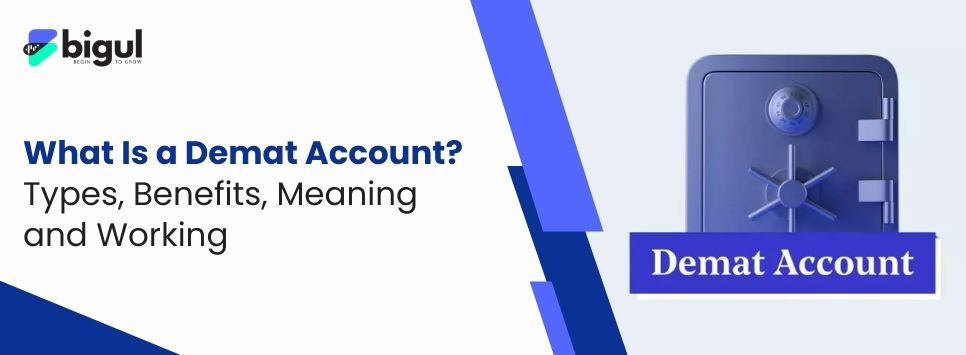What is a Demat Account? Meaning, Types, Benefits & How it Works in India

Strong 8k brings an ultra-HD IPTV experience to your living room and your pocket.
What is a Demat Account? Meaning, Types, Benefits & How It Works
Managing your investments today is a lot easier than it used to be, thanks to something called a Demat account. If you're new to investing, this term might sound a bit technical—but don't worry. In this blog, we’ll break down exactly what a Demat account is, how it works, the different types available in India, and why it's so important if you want to invest in the stock market.
Demat Account Meaning (In Simple Terms)
A **Demat account**, short for **Dematerialized account**, is like a digital locker where your shares and securities are stored electronically. Instead of holding physical paper certificates, everything you own—stocks, mutual funds, bonds—is safely held online.
It’s the first thing you need if you want to trade or invest in the Indian stock market.
Why Was the Demat Account Introduced?
Before Demat accounts, shares were issued in paper format. It was slow, risky (think: theft or damage), and filled with paperwork.
So, in 1996, India moved to an electronic system to make investing smoother, safer, and faster. The **National Securities Depository Limited (NSDL)** and **Central Depository Services Limited (CDSL)** were established to manage electronic securities.
How Does a Demat Account Work?
A Demat account works just like a savings account, but instead of money, it holds your financial instruments. Here’s how it functions:
1. **You place a trade** (buy/sell) through your trading account.
2. The transaction is sent to the stock exchange.
3. Once confirmed, the shares get credited or debited from your Demat account.
4. All your holdings are stored electronically.
Your Demat account is linked to:
* Your **trading account** (to place orders)
* Your **bank account** (to transfer funds)
Types of Demat Accounts in India
Depending on who you are and where you're from, there are different types of Demat accounts available:
1. Regular Demat Account
* For Indian residents.
* Holds shares, ETFs, mutual funds, and bonds.
2. Repatriable Demat Account
* For NRIs (Non-Resident Indians).
* Allows fund transfers abroad.
* Needs to be linked to an NRE bank account.
3. Non-Repatriable Demat Account
* Also for NRIs.
* Doesn’t allow fund transfers abroad.
* Linked with an NRO bank account.
Benefits of a Demat Account
Why do over 100 million investors in India use Demat accounts? Because they offer massive advantages:
1. **Safe & Secure**: No risk of theft, damage, or loss of certificates.
2. **Convenient**: Buy, sell, or hold assets with a few clicks.
3. **Paperless**: Say goodbye to long forms and courier delays.
4. **Faster Settlement**: T+1 settlement cycle means quicker trade processing.
5. **Easy Portfolio Tracking**: View all your investments in one place.
6. **Low Costs**: Minimal annual maintenance charges with many brokers.
Documents Required to Open a Demat Account
To get started, here’s what you’ll need:
* PAN Card
* Aadhaar Card (or any address proof)
* Passport-size photograph
* Bank proof (cheque or statement)
* Signature (scanned or physically signed)
Things to Check Before Opening a Demat Account
With so many brokers out there, make sure you look at:
* **Charges**: AMC (Annual Maintenance Charges), transaction fees.
* **Broker Reputation**: Go for SEBI-registered, well-rated brokers.
* **Interface**: A user-friendly app/website helps a lot.
* **Support**: Good customer service saves time and frustration.
How to Open a Demat Account Online (in 10 Minutes!)
Opening a Demat account is now a breeze:
1. Choose a SEBI-registered stockbroker like **Bigul**.
2. Fill out the online form.
3. Upload required KYC documents.
4. E-sign using Aadhaar OTP.
5. Complete In-Person Verification (IPV) via video.
6. Get your login credentials and start investing.
What Can You Hold in a Demat Account?
You can store multiple financial instruments:
* Equity shares
* Mutual funds
* Government bonds
* ETFs
* IPO shares
* Corporate fixed deposits
Common Demat Account FAQs (To Be Added as FAQ Schema)
**Q1. Is a Demat account mandatory for IPOs?**
Yes, shares allotted via IPOs are directly credited to your Demat account.
**Q2. Can I open multiple Demat accounts?**
Yes, with different brokers. But each must be linked to your PAN.
**Q3. Are there any charges on Demat accounts?**
Yes, mainly annual maintenance charges and transaction fees.
**Q4. Can I convert physical shares to Demat?**
Absolutely. Submit the physical certificates to your broker for dematerialization.
**Q5. What happens if I don’t use my Demat account?**
It may get frozen. Brokers may also charge inactivity fees.
Final Thoughts
A Demat account is your digital passport to India’s financial markets. Whether you're planning to invest in stocks, mutual funds, or IPOs, having a Demat account is a must. It’s easy to open, safe to use, and absolutely essential in the modern investment world.
**Ready to open your Demat account?**
Choose Bigul for an easy, transparent, and tech-driven investing experience.
Note: IndiBlogHub features both user-submitted and editorial content. We do not verify third-party contributions. Read our Disclaimer and Privacy Policyfor details.


